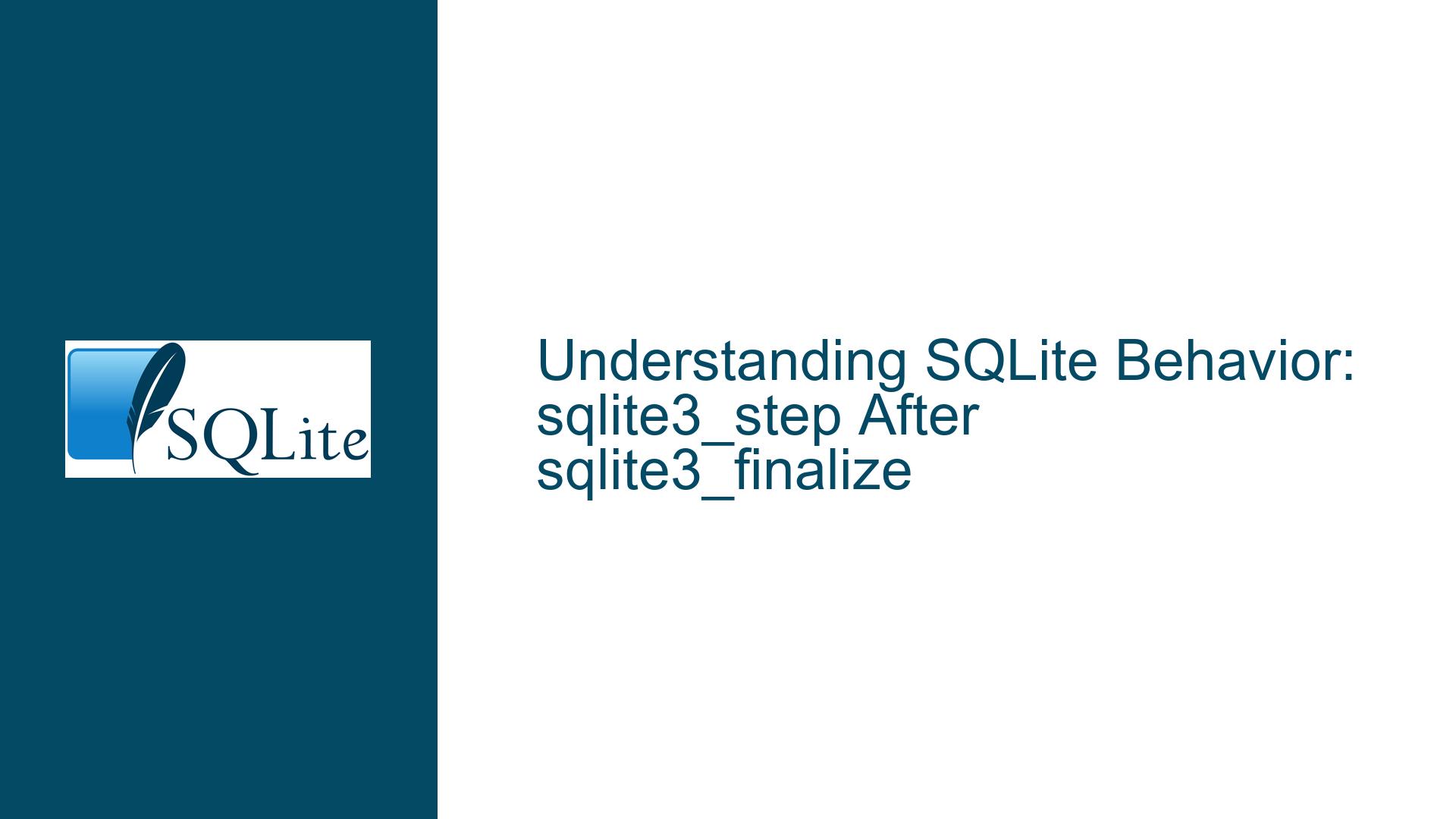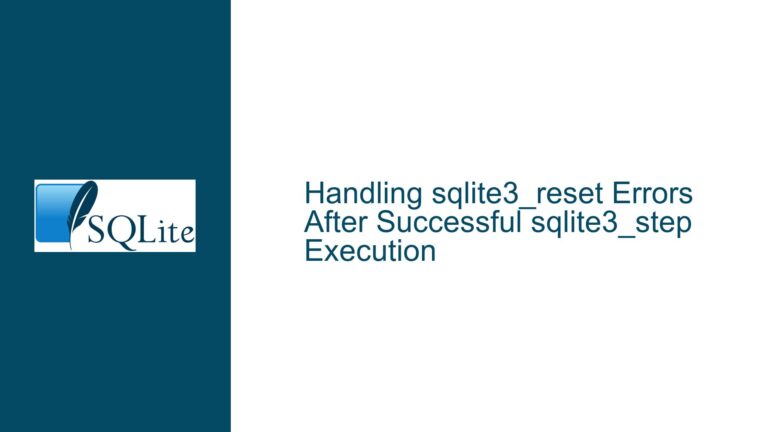SQLite Behavior: sqlite3_step After sqlite3_finalize
Issue Overview: sqlite3_step on a Finalized Statement
The core issue revolves around the behavior of SQLite when sqlite3_step is called on a prepared statement that has already been finalized using sqlite3_finalize. This scenario raises questions about the expected behavior, the consistency of SQLite’s documentation, and the potential for undefined behavior, including segmentation faults.
In SQLite, a prepared statement is a compiled SQL command that can be executed multiple times with different parameters. The lifecycle of a prepared statement typically involves the following steps: preparation (sqlite3_prepare_v2), execution (sqlite3_step), and finalization (sqlite3_finalize). Finalization is the process of releasing the resources associated with the prepared statement, effectively marking it as no longer usable.
The confusion arises from the fact that, prior to a specific SQLite check-in (f7ab01f2), calling sqlite3_step on a finalized statement would return SQLITE_MISUSE, which is a clear indication of improper usage. However, after a subsequent check-in (52a12e47), the same operation results in a segmentation fault. This change in behavior has led to questions about what the expected behavior should be and whether the documentation adequately reflects the potential outcomes.
The documentation for sqlite3_step states that calling it on a finalized statement is inappropriate and may result in SQLITE_MISUSE. On the other hand, the documentation for sqlite3_finalize warns that using a prepared statement after it has been finalized can lead to undefined behavior, including segmentation faults and heap corruption. This discrepancy has led to confusion about whether the documentation for sqlite3_step should be updated to more explicitly warn about the potential for crashes.
Possible Causes: Undefined Behavior and Documentation Ambiguity
The root cause of the issue lies in the concept of undefined behavior in programming. Undefined behavior occurs when a program performs an operation whose result is not specified by the language or library. In the context of SQLite, calling sqlite3_step on a finalized statement is an example of undefined behavior. The SQLite documentation explicitly states that using a prepared statement after it has been finalized can result in undefined behavior, which includes the possibility of segmentation faults, heap corruption, or other unpredictable outcomes.
The ambiguity in the documentation arises from the fact that the behavior of sqlite3_step when called on a finalized statement is not strictly defined. While the documentation for sqlite3_step mentions that calling it on a finalized statement is inappropriate and may result in SQLITE_MISUSE, it does not explicitly state that this is the only possible outcome. The documentation for sqlite3_finalize, on the other hand, is more explicit about the potential for undefined behavior, including crashes.
The change in behavior observed after the check-in 52a12e47 is likely due to changes in the internal memory management of SQLite, specifically related to the default lookaside configuration. The lookaside memory allocator is a performance optimization used by SQLite to reduce the overhead of memory allocation for small, frequently used objects. Changes to this allocator could affect how SQLite handles memory for prepared statements, potentially leading to different outcomes when a finalized statement is used.
Another possible cause of the issue is the lack of a clear contract in the SQLite API regarding the behavior of sqlite3_step on a finalized statement. While the documentation provides some guidance, it does not explicitly define the expected behavior in all cases. This lack of a strict contract allows for variability in how different versions of SQLite handle the situation, leading to the observed differences in behavior.
Troubleshooting Steps, Solutions & Fixes: Ensuring Proper Use of Prepared Statements
To address the issue of undefined behavior when calling sqlite3_step on a finalized statement, developers should take the following steps to ensure proper use of prepared statements in SQLite:
1. Adhere to the Lifecycle of Prepared Statements:
The first and most important step is to strictly adhere to the lifecycle of prepared statements. This means that once a prepared statement has been finalized using sqlite3_finalize, it should no longer be used. Any attempt to use a finalized statement, including calling sqlite3_step, should be avoided. Developers should ensure that their code follows the correct sequence of operations: prepare, execute, and finalize.
2. Track the State of Prepared Statements:
To prevent the use of finalized statements, developers should implement a mechanism to track the state of prepared statements in their code. This can be done by maintaining a flag or a state variable that indicates whether a statement has been finalized. Before calling sqlite3_step, the code should check this flag to ensure that the statement has not been finalized. If the statement has been finalized, the code should either return an error or take appropriate action to avoid undefined behavior.
3. Use SQLite’s Error Handling Mechanisms:
SQLite provides robust error handling mechanisms that can be used to detect and handle improper usage of prepared statements. Developers should always check the return values of SQLite functions, including sqlite3_step and sqlite3_finalize, to ensure that they are being used correctly. If sqlite3_step returns SQLITE_MISUSE, the code should handle this error appropriately, such as by logging an error message or terminating the operation.
4. Update Documentation and Code Comments:
To avoid confusion, developers should ensure that their code is well-documented, with clear comments explaining the proper use of prepared statements. Additionally, if the SQLite documentation is found to be ambiguous or incomplete, developers can contribute to the SQLite project by submitting updates or clarifications to the documentation. This can help ensure that future users of SQLite have a clear understanding of the expected behavior.
5. Test for Undefined Behavior:
Developers should thoroughly test their code to ensure that it does not rely on undefined behavior. This includes testing edge cases, such as calling sqlite3_step on a finalized statement, to ensure that the code handles these situations gracefully. Automated tests can be written to verify that the code behaves as expected in all scenarios, including those that involve undefined behavior.
6. Consider Using Higher-Level Abstractions:
To reduce the risk of improper use of prepared statements, developers can consider using higher-level abstractions or ORM (Object-Relational Mapping) libraries that handle the lifecycle of prepared statements automatically. These libraries can provide a safer and more convenient interface for interacting with SQLite, reducing the likelihood of errors related to prepared statements.
7. Stay Informed About SQLite Updates:
SQLite is actively developed, and new versions may introduce changes that affect the behavior of prepared statements. Developers should stay informed about updates to SQLite and review the release notes for any changes that may impact their code. If a new version of SQLite introduces changes that affect the behavior of sqlite3_step or sqlite3_finalize, developers should update their code accordingly.
8. Contribute to the SQLite Community:
If developers encounter issues or ambiguities in the SQLite documentation or behavior, they can contribute to the SQLite community by reporting bugs, suggesting improvements, or submitting patches. The SQLite project is open-source, and contributions from the community help improve the quality and reliability of the software.
By following these steps, developers can ensure that their use of prepared statements in SQLite is correct and robust, avoiding the pitfalls of undefined behavior and ensuring that their code behaves predictably across different versions of SQLite.
In conclusion, the issue of calling sqlite3_step on a finalized statement highlights the importance of understanding and adhering to the lifecycle of prepared statements in SQLite. By following best practices and taking proactive steps to ensure proper use of prepared statements, developers can avoid undefined behavior and ensure that their code is reliable and maintainable.






